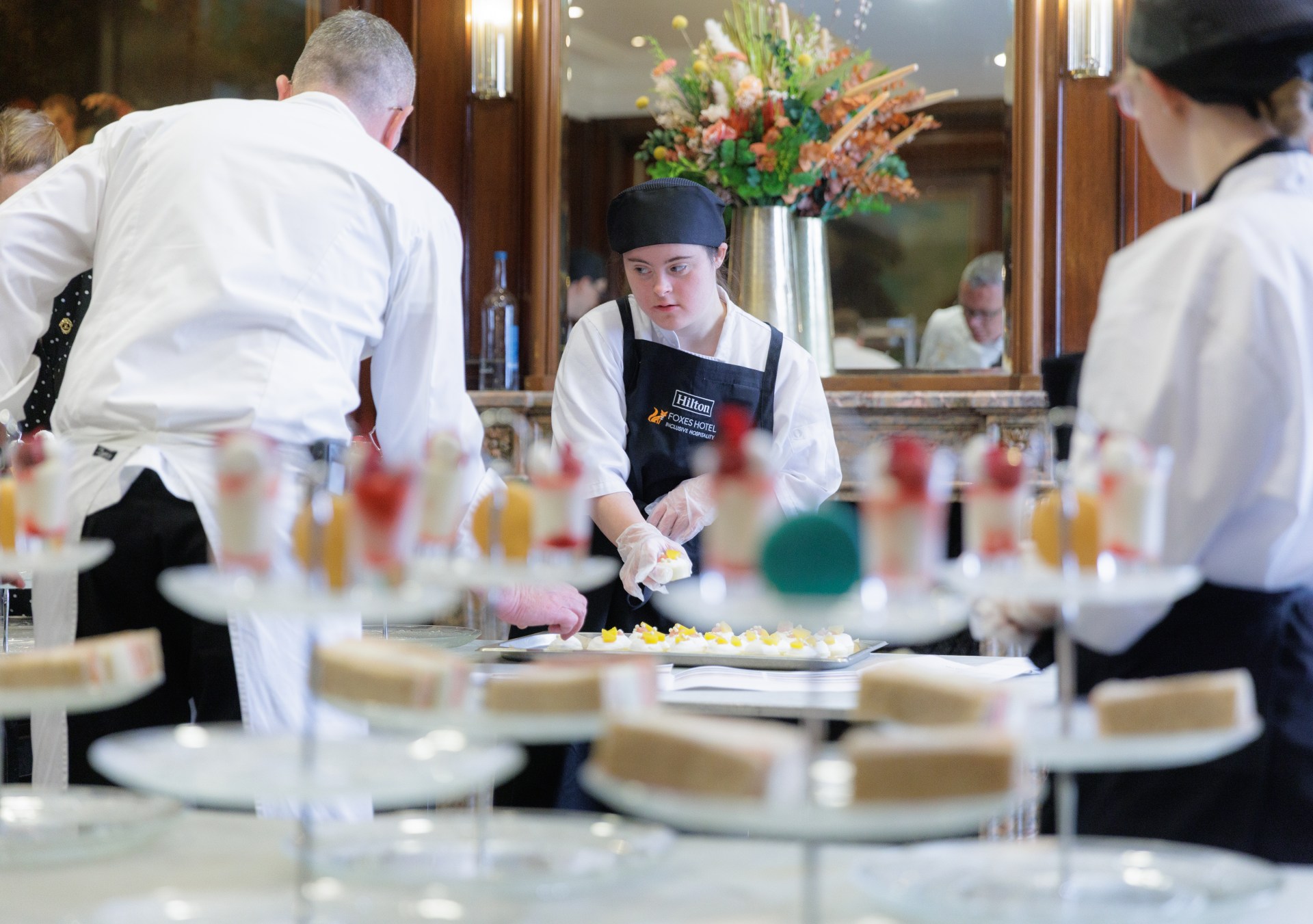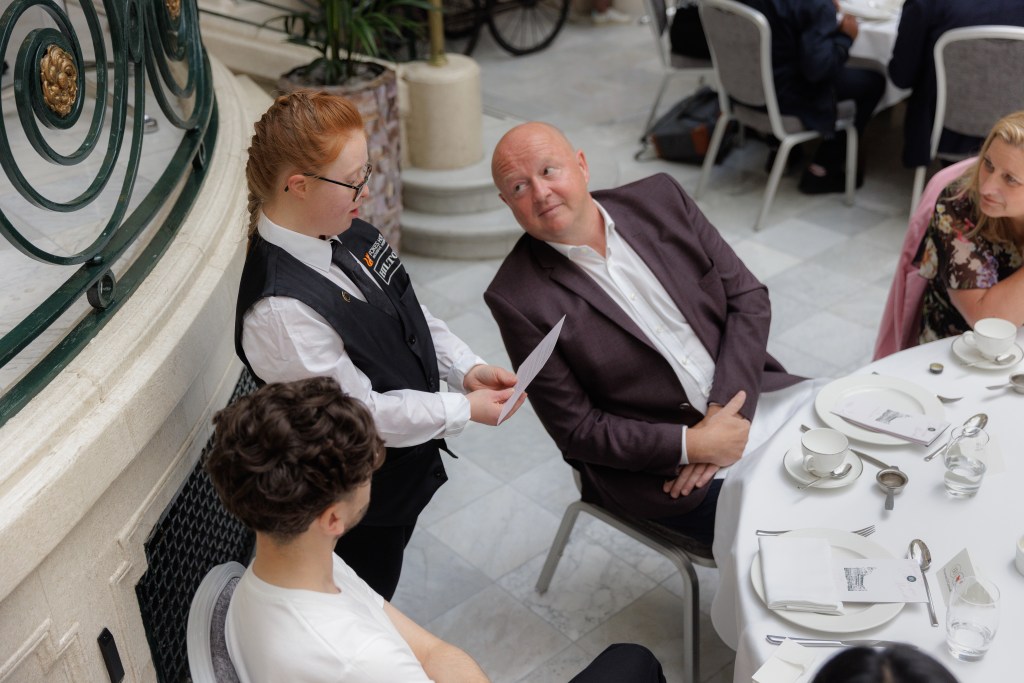- Three quarters of people with a learning disability (74%) would be more confident applying for jobs if they saw similar people in customer facing roles
- Only 16% of people with a learning disability in the workforce report having a role model with a similar disability
- Seven in 10 of the general public agree UK companies do not do enough to consider people with learning disabilities for job roles
- To highlight the importance of role models and inclusion in the workplace, Hilton launches a pop-up tearoom at The Waldorf Hilton, London – where the afternoon tea is prepared and served by those with learning disabilities.
LONDON – A lack of visible role models in the workplace – particularly in customer-facing roles – is a major barrier to seeking employment for adults with learning disabilities such as Down’s Syndrome, Autism and Aspergers, new research has revealed.
In the UK, there are 1.5 million people with learning disabilities, but only 5% are currently employed.
Hilton’s survey of more than 500 people with learning disabilities and their carers* found that 79% believe businesses should do more to promote job opportunities to those with disabilities and highlight the value they’re able to bring to job roles.
Doing so could have a significant impact on employment levels among those with learning disabilities, as three quarters (74%) would feel more confident applying for roles if they saw more people with similar disabilities in the workforce.
Despite this, just 16% of respondents who are in the workforce said they have a role model with a similar condition to connect with and learn from.
The study, released to mark Learning Disability Week (16th - 22nd June), highlights the importance of hiring, supporting and celebrating employees with learning disabilities, particularly in customer facing service roles across sectors such as hospitality and retail.
Representation crucial to inspiring change
The findings underline the powerful ripple effect role models can have – not only on jobseekers, but their carers too. Yet such moments of visibility remain rare: only a quarter (25%) of carers say they have ever been served by someone with a learning disability. When they have, the impact is clear – 70% said it motivated them to help their dependent find fulfilling work, and three quarters (75%) said it made them realise the person they care for could be a role model to others.
This view is shared by the wider public. Hilton also undertook polling among more than 2,000 consumers, which found widespread support for greater inclusion of people with a learning disability in customer facing roles.
85% said that having more people with learning disabilities in these positions would inspire others to apply, while nine in 10 (93%) said it was important to see staff from all backgrounds in hospitality roles. Three quarters (75%) said there weren’t enough people with learning disabilities in such jobs.
“Representation matters – seeing people like yourself succeed at work builds confidence and opens doors to career opportunity.”
Stephen Cassidy, senior vice president, UK & Ireland, Hilton, said: “Representation matters – seeing people like yourself succeed at work builds confidence and opens doors to career opportunity. Our team members with learning disabilities contribute across a wide range of roles, from front-of-house positions like reception and concierge to behind-the-scenes work in kitchens, housekeeping, and revenue management. They bring unique strengths and a strong commitment that enrich our culture and elevate the guest experience. By providing the right support and fostering an inclusive environment where everyone feels valued, we empower individuals to reach their full potential and demonstrate that inclusion is a powerful driver of success in hospitality.”
Sam Innes, Food and Beverage Assistant, The Waldorf Hilton, London added: “Finding work was really difficult for me, so when I started my role at Hilton, it was such a relief. I’ve always wanted to work and be around people, and I knew a hotel would be the perfect place to do that. Having a job helps people with learning disabilities feel valued and shows others what we can achieve when given the chance. It’s boosted my confidence and helped me become more independent. Now, I want to be a role model and inspire others to believe that they can do it too.”
Hilton announces afternoon tea prepared and served by individuals with learning disabilities
(Picture by Nick Morrish/Morrish & Co)
This year marks the 10th anniversary of Hilton’s partnership with Aurora Foxes, a hospitality college and training hotel in Minehead that supports young people with learning disabilities. Over the past decade, the collaboration has provided 89 work placements, with 15 former students currently employed in roles with Hilton. A long-standing partnership with the Down’s Syndrome Association (DSA) has also enabled 52 work placements, with almost 40 team members currently working at Hilton through the DSA’s WorkFit programme.
To celebrate the valuable contributions of people with learning disabilities in the workforce, Hilton opened a pop-up tearoom at The Waldorf Hilton, London, on 16 June. The event featured a special performance from blind, autistic musical savant Derek Paravicini.
The tearoom gave Aurora Foxes students real-world experience preparing and serving afternoon tea, including a signature two-tone macaroon created especially for the event. The macaroon, inspired by vintage sweet-shop flavours and Aurora Foxes’ college colours, was co-created by six students and their chef tutor alongside Executive Head Chef Malcolm Camilleri. Ahead of the launch, students also visited the hotel to help design the menu and service, while leaders from the hotel provided training at Aurora Foxes – strengthening this two-way partnership.
Following the success of the launch, additional public sittings will take place on 2 July at 12 noon, 2:30pm, and 5:00pm. Tickets are priced at £49.50 and will be allocated on a first come, first served basis. To book, please contact: Homage.Restaurant@Hilton.com.
Mark Costello, Principal at Aurora Foxes, said: “When people with learning disabilities see others like themselves thriving in customer-facing roles, it inspires confidence and ambition. By providing meaningful employment opportunities for people with learning disabilities, Hilton is transforming lives, challenging perceptions, and breaking down barriers in the wider community. Our work together is about creating a society where everyone has the opportunity to contribute and succeed”.
To learn more about working at Hilton, visit: https://jobs.hilton.com/emea/en
To learn more about Aurora Foxes, visit: https://www.theauroragroup.co.uk/services/colleges/foxes-college
To learn more about the Down’s Syndrome Association, visit: https://www.downs-syndrome.org.uk/
*Research was conducted by Savanta on behalf of Hilton between 2nd May and 12th May 2025. Respondents were formed of 2,087 general population with a broadly even split of gender and age, as well as 512 respondents with a learning disability (including conditions such as Aspergers and Down’s Syndrome), or the parent/carer of someone with a learning disability.
About Hilton
Hilton (NYSE: HLT) is a leading global hospitality company with a portfolio of 25 world-class brands comprising 9,000 properties and over 1.3 million rooms, in 141 countries and territories. Dedicated to fulfilling its founding vision to fill the earth with the light and warmth of hospitality, Hilton has welcomed over 3 billion guests in its more than 100-year history. Named as the No. 1 World’s Best Workplace by Great Place to Work and Fortune, Hilton aims to create the best culture for its 500,000 team members around the world. Hilton has introduced industry-leading technology enhancements to improve the guest experience, including Digital Key Share, automated complimentary room upgrades and the ability to book confirmed connecting rooms. Through the award-winning guest loyalty program Hilton Honors, the more than 235 million Hilton Honors members who book directly with Hilton can earn Points for hotel stays and experiences money can't buy. With the free Hilton Honors app, guests can book their stay, select their room, check in, unlock their door with a Digital Key and check out, all from their smartphone. Visit stories.hilton.com for more information, and connect with Hilton on Facebook, X, LinkedIn, Instagram and YouTube.
About Aurora Foxes
Visit Aurora Foxes | Special Needs Education in Minehead | Aurora Group for more information.


